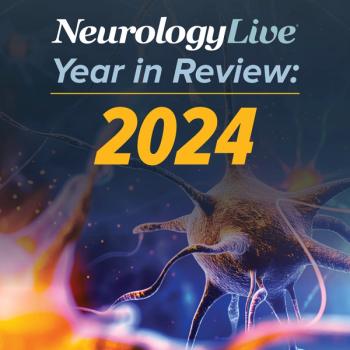
Results from the open-label phase 1/2 study of tividenofusp alfa demonstrated positive effects on evidence-based surrogate end points in participants with Hunter syndrome.

Results from the open-label phase 1/2 study of tividenofusp alfa demonstrated positive effects on evidence-based surrogate end points in participants with Hunter syndrome.

The Delphi-MD platform is designed for nerve stimulation in diagnostic applications, offering clinicians a tool to support objective and personalized treatment approaches in brain health.

Results from Vigil Neuroscience’s ongoing phase 1 trial of VG-3927 in healthy volunteers supported the continued development of the therapy as a potential once-daily oral treatment for Alzheimer disease.

Catch up on any of the neurology news headlines you may have missed over the course of December 2024, compiled all into one place by the NeurologyLive® team.

These were the most-read FDA approval stories that were part of our coverage in 2024, brought to you as part of NeurologyLive®'s Year in Review.

Adults with obstructive sleep apnea who receivied tirzepatide achieved an average of up to 20% weight loss and experienced at least 25 fewer breathing interruptions for each hour slept.

The program assembles a collaborative team of in-house and external experts in research, clinical care, and regulatory affairs to navigate gene therapy programs through the drug development process.

As of July 2024, 2 participants in the ongoing CONNECT1 study have received 4 doses of PGN-EDO51 at 10 mg/kg, which has been generally well tolerated, with initial results expected in early 2025.

Most recently reported topline data from the RewinD-LB phase 2b trial in patients with dementia with Lewy bodies showed that neflamapimod failed to meet its primary end point and secondary end points.

Findings from the ongoing PERSEUS phase 3 study of tolebrutinib in primary progressive multiple sclerosis are anticipated to be reported in the second half of 2025.

The FDA recommended a follow-up meeting with Clene to further discuss the analyses needed to support the accelerated approval pathway for CNM-Au8 in amyotrophic lateral sclerosis.

The FDA has agreed that a scale used in ongoing phase 1/2 clinical trials could potentially serve as an intermediate clinical end point for accelerated approval pathway for uniQure’s investigational gene therapy AMT-130.

A recently initiated phase 1/2 trial of NS-050/NCNP-03 will assess patients with Duchenne muscular dystrophy on dystrophin production, muscle strength, mobility, and functional exercise capacity.

Catch up on any of the neurology news headlines you may have missed over the course of November 2024, compiled all into one place by the NeurologyLive® team.

Applied Therapeutics noted that it is reviewing the FDA's feedback and will request a meeting to discuss requirements for either a resubmission of the NDA or appeal of the agency's decision.

The software, designed using thousands of brain MRI scans, is used for automated detection and severity grading of ARIA-E and ARIA-H for safety monitoring of new Alzheimer disease therapies.

Nerivio, a nondrug option for acute migraine attacks and prevention of migraine with or without aura, has been FDA-approved for several years in adolescents aged 12 and older as well as adults.

A previous 5-year analysis showed that pediatric patients with aromatic L-amino acid decarboxylase deficiency when treated with eladocagene exuparvovec experienced durable developmental, motor, and cognitive improvements.

Capsida’s CAP-002 gene therapy, currently advancing through IND-enabling studies, aims to address the unmet needs of patients with STXBP1-related developmental and epileptic encephalopathy by stably supplementing STXBP1 protein.

Catch up on any of the neurology news headlines you may have missed over the course of October 2024, compiled all into one place by the NeurologyLive® team.

Rapport Therapeutics’ is actively recruiting patients for its phase 2a trial investigating its lead therapy candidate RAP-219 among patients with focal epilepsy, with topline data anticipated in mid-2025.

The NDA includes data from a global placebo-controlled, 72-week study as well as findings from the STRIDE registry, an ongoing, observational, real-world study of ataluren in routine care.

STS101 showed promising results in previous trials, with significant pain relief and minimal adverse events reported, reinforcing its potential as a viable treatment for patients with migraine.

A subgroup analysis of the phase 3 Clarity AD open-label extension study showed a 14% increased amyloid plaque removal with subcutaneous lecanemab vs intravenous administration, the administration for which it was FDA-approved for.

Mind Moments®, a podcast from NeurologyLive®, brings you an exclusive interview with Anne Marie Morse, DO, FAASM. [LISTEN TIME: 12 minutes]

Sodium oxybate is the only FDA-approved once-at-bedtime treatment for cataplexy or excessive daytime sleepiness in pediatric patients with narcolepsy.

In clinical trials, patients with Parkinson disease who were treated with foscarbidopa/foslevodopa experienced superior improvement in ON time without dyskinesia compared with oral immediate-release carbidopa/levodopa.

Catch up on any of the neurology news headlines you may have missed over the course of September 2024, compiled all into one place by the NeurologyLive® team.

The decision follows positive data from multiple trials, showing significant improvement in both cardiac function and muscle performance in patients with DMD.

The hope is that NP001 could potentially slow the progression of the disease through its unique immunologic mechanism.